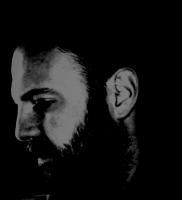"Coyotes," "Pittsburgh," and "First Snow"
Coyotes
In the country,
coyotes work the margins
turkeys and bucks are prized,
canids despised
so young men hunt them with mice
Hunger will always take the bait:
budgets and give aways
trash and food, poison and gold
Motivation-as-bricolage.
Walking in my city
I spy a coyote in raccoon clothing
seeking treasure in a dumpster
Above him in a weedy tree
is a raccoon who is sleeping
might just be dreaming him:
rodent prince from a Russian ballet.
School children leave wrappers, paper
in my front yard walking home
and by way of explanation:
They are too young to know
A factory in town makes armoured personnel carriers
sold to Saudi Arabia for use against Yemenis
by way of rationale: it takes profits to outfit peacekeepers
The metropolis is ever anonymous
but at the woods and field’s edge
the rodent prince says
those whose teeth never cease
shall inherit the rub.
Pittsburgh
“The anvil seems to be getting the worst of it, but the hammer breaks first.” -Contradictionary
I would prefer
to be some perfect spiral
cloud of dust
off a stolen base
polished blade at center ice
To be the foam from a perfect pour
the story of how the bartender
learned her tools: the technical Tao
of serving alcohol
Or the feel of crimson ivy
set to the measured distance of a sporting wall;
a warning track of blue hued smoke
October in behind the last play
To arrive as the crowd’s conniption
at the Immaculate Reception
turning a gaggle of bitter snow
to a pain no longer felt.
Pittsburgh:
My world is labor
and pans for its pay
sifting nuggets of right work
through a strain of training to find:
Wideman’s mind
the reach of Ellis and Blass
grand seasons etched
in silver or brass
a square home cooked and lathered
in Heinz sauce.
First snow
Pushkin published an ode to winter
praising something purer than mud
Aristocrats on annuities in drawing rooms
held bromances of the mire,
tempest glances by garment pulses
with breasts as powdered as the pines.
But snow is snow, a thing to bemoan
especially when one is expected to be
Amundsen outpacing Scott
on the ice ways of vocation.
I might wish myself a sleigh
in a Russian ballet,
but this storm is more Pasternak
than Tolstoy;
scarcely a memoir of lapsed feasts
to calm the reflux of aspiration.

Jeremy Nathan Marks lives in the Great Lakes Region of Canada. His latest book is Caucus Country (Alien Buddha Press, 2024). He might hold his breath until the second Tuesday in November, breaking the world record. Jeremy recommends the Center for Biological Diversity.


